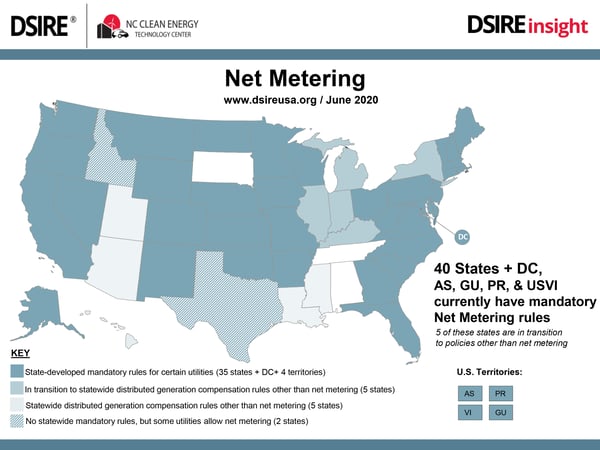Publish Date: July 30th, 2020
Blog Updated: January 2022
One of the key concepts in how solar energy economics operates is net metering. Once understood, it’s a simple concept, yet most home and property owners are not familiar with the term. So, what is net metering, why is it a crucial part of the solar energy billing process, and what does Colorado net metering policy look like?
What is net metering?
Net metering is a big financial incentive for those choosing to go solar. When you choose to have solar panels installed, you’re generating your own electricity. If you produce more electricity than you use at any point in the day, whether you’re a homeowner or own a commercial building, you're able to receive credits from the utility company toward future energy bills.
For example, if you’re a homeowner who is out of the house during the day when your solar panels are producing the most power (because that’s when the sun is out), you are likely producing more energy than you are consuming. Because of net metering, you’re exporting that unused electricity back to the grid and getting credits that can be applied to the times when you are using electricity from the grid.
With net metering, there's a one-to-one equivalence of the value of the energy you're purchasing from your utility and the value of the energy you're pushing back to the utility from your solar system. As a result, you're able to offset the cost of your electricity bill with the energy you are producing.
However, your rate structure can also vary depending on where you live. For example, Fort Collins Utilities adopted the Time of Use rate structure. This means that instead of paying the same amount of money for all of the energy that you use, you pay different rates of energy depending on what time of day you use that energy.
During the solar panel installation process, your existing meter may be swapped out for a net meter that can run backward. Your meter runs backward when you are producing more energy than you are using, effectively storing credits for a future scenario when your home is consuming more energy than your solar panels are producing.
 Courtesy of the U.S. Department of Energy and the Database for State Incentives for Renewables & Efficiency
Courtesy of the U.S. Department of Energy and the Database for State Incentives for Renewables & Efficiency
Colorado Net Metering
Net metering is legislated on the state level, so net metering laws and compensation vary on a state-by-state basis and details get worked out at the utility level.
Colorado net metering policy began in December 2005, after voters approved Amendment 37, a public renewable energy ballot initiative, in November 2004. The Colorado Public Utilities Commission (PUC) in turn incorporated standards for net metering and interconnection. In March 2018, solar systems with solar battery backup were also approved for net metering.
Colorado net metering policy allows for solar energy customers to receive credits for the energy their solar panels generate – up to 200% of their electricity usage for the regulated utilities, such as Xcel Energy.
In Colorado, if you generate more electricity than you use, those extra kWh can be applied to your next energy bill. For Xcel customers, at the beginning of your contract, you decide what to do with your credits should your net production of energy be more than your consumption of energy for an entire calendar year. You must choose whether you want the utility to reimburse you or to roll it over. Other utilities provide monthly bill monetary credits.
However, it is important to note that purposefully oversizing your system to receive energy credits does not give you the best return on investment (ROI). That's because the excess electricity either continues to roll over and never get used because your system is producing so much excess or it is bought by the utility at a low wholesale price. Either way, it doesn't drastically improve the economics of your system to significantly overproduce. Our solar experts can work with you to design a system that maximizes the economic returns for your household, which usually ends up being sized around 100%.
If you’re not a Colorado resident, you can learn more about other states’ net metering policies here.
Net Metering Economic Benefits
Net metering isn’t just good for your electricity bills. It also offers considerable economic benefits by creating jobs and investment opportunities.
The solar energy industry employs nearly 250,000 Americans, according to The Solar Foundation. This can be attributed largely to robust net metering policies in most states. Net metering is an attractive incentive for customers to go solar, and their investment in renewable energy creates jobs for the installers, electricians, designers, and solar panel manufacturers.
Net metering also offers benefits to utility companies. Utilities are purchasing carbon-free energy generation at the point where the loads exist without needing to pay for the equipment. This, in turn, helps them meet their carbon-reduction goals and comply with associated laws and regulations. It also offers utilities the opportunity to lower their infrastructure equipment and maintenance costs.
If you want to learn more about net metering or to see if solar is right for you, contact our non-commissioned solar experts. We love informing people how solar can benefit them and helping people understand how net metering can help you save money on your energy bills.

